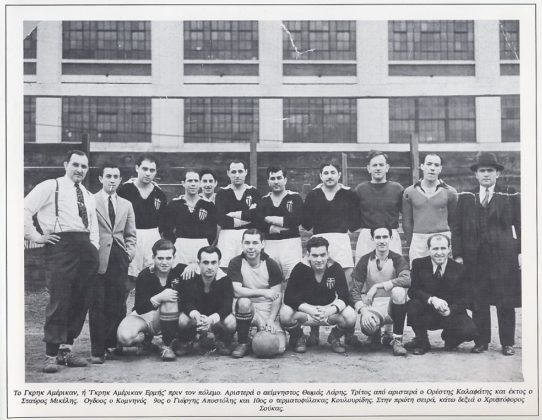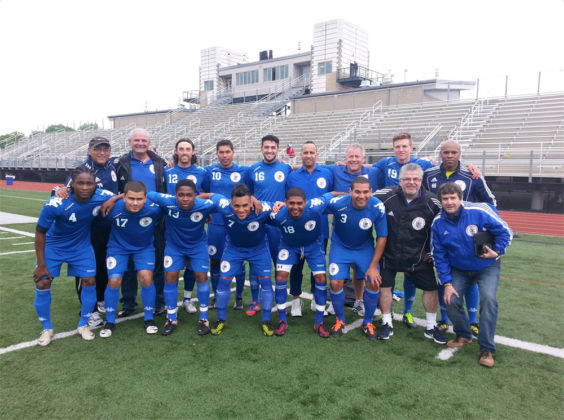An Olympian Legacy: The New York Greek American Soccer Club
by Anastasia Kaliabakos
Greece is famous for many things, among them being the development of the Olympic Games, the global event that defines athletic prowess in dozens of different sports from around the world. The Olympic Games were brought to reality in Ancient Greece, serving as not just a source of athletic entertainment, but a way to worship the Greek gods and socialize with other city states and kingdoms of Ancient Greece. The exact origin of the Olympics remains a mystery– some say that the famous hero Heracles, son of Zeus, built the Olympic stadium after completing his 12 labors, or that they stemmed from a tradition of footracing that started in 776 B.C. Although the Greek games came to an end in the 4th century A.D., they were revitalized in the mid 19th century after Greece gained its independence from the Ottoman empire and soon became a worldwide phenomenon that billions of people look forward to every four years.

The team in 1946
The significance of sports to Greek culture remains intact, as exemplified by not just the Olympics, but the everyday efforts of Greek Americans to pay homage to their history in the form of sport clubs. The New York Greek American Soccer Club has held its own in Greek American culture, reaching its 76th Year Anniversary this year. I have been exposed to the efforts of NYGASC through my pappou, Andreas Kaliabakos. Growing up, I have always been in awe of the athletic prowess of my pappou and he has talked for many years about his involvement in the Greek American soccer club. I have always been interested in the history of Greek American since it has been a peripheral part of my life for so long; therefore, I set out to relay the history of this significant Greek organization so that a modern audience may grasp how large an effect Greek American has had on the lives of New York City Greeks for generations.

The Greek American athletic association was the first and oldest Greek athletic society in the U.S. It is uncertain when the group was actually founded, but it is believed that it was towards the beginning of the 20th century. Initially, those involved engaged in track and field, weight lifting, and wrestling. Since there was no specific facility to practice in, the athletes would exercise in the basements of various Greek churches in New York. Additionally, another Greek athletic club called “Hermes” was popular at the same time. Three of the Hermes athletes actually participated in the 1932 Olympics in Los Angeles: Ioannis Moralis, Ioannis Farmakidis, and Nikolaos Mastoridis. In 1935, the clubs joined forces so as to have one joint soccer team, known as “Greek American Hermes.” Unfortunately, all of the fun and games were put to a halt with the onset of World War II. A poignant story related by historian Christopher Soukas describes December 7, 1941, when the team of Greek American Hermes learned of the bombing of Pearl Harbor. Their soccer game was interrupted and the athletes departed from the site, knowing that the next day they would have to enlist for the army. This marks the moment when the organization was temporarily dissolved.
After the end of the war, the club re-appeared in 1946 as “Greek American” only. At the beginning of 1946, there was an expatriate association known as S.E.N. (Sindesmos Ellinon Neofermenon) or the “Joining of Greek Newcomers.” The S.E.N. organized events for young Greek men and women, including gatherings at Central Park to play soccer. It is said that Thomas Laris, a huge lover of soccer from Smyrna and a part of S.E.N, put together what we now know as Greek American. He, along with Anthony Antoniadis and Panos Kolimbaris, sought to bring Greek American to new heights and to find a place among the Greek community of New York.
Kolimbaris suggested getting help from The Ethnikos Kirikas, which was, back then, located on 26th street between 6th and 7th Avenue in Manhattan, and its publisher at the time, Vaso Vlaviano. The meeting at the Kirikas office took place during the summer of 1946 and was a success. The paper agreed to report on the activities of the Greek American soccer team and, in doing so, made Greek American an official aspect of Greek New York culture.

The team today
Thomas Laris became the first coach in the history of Greek American and Panos Kolimbaris was the first president. Matches were regularly scheduled at both Central Park and Van Cortlandt Park. The first championship matches started right away in the fall of 1946 to the enjoyment of players and Greek-American onlookers. Since then, Greek American has won four U.S. Open Championships in 1967, 1968, 1969, and 1974. The club is one of only two teams to have ever won this tournament in three consecutive years. They have also won many other kinds of championships over the years. To this day, Greek American remains one of the most successful and longest continually operating team in American soccer history.
According to the Greek American website, “The team currently plays in the 5th tier of the American soccer pyramid, under the USASA in the Cosmopolitan Soccer League. The club plays out of the Metropolitan Oval in Maspeth, Queens and has been a perennial contender in the league, winning five of the last eleven Eastern New York Championships.” In 2014, N.Y. Greek American team won the U.S. Amateur National Cup, making the club one of only a handful in the U.S. that has won both the U.S. Open Cup and the U.S. Amateur Cup national titles, and the only one to complete this since the advent of the MLS. Greek Americans’ first team currently competes in the Eastern Premier Soccer League (which is the 3rd tier U.S.) in the Metropolitan Conference. The reserve team also competes in the Long Island Soccer Football League. The club currently has 3 youth teams, U6 boys, U7 boys, and U9 boys, and they hope to establish even more in the future. It is important for clubs like Greek American to thrive, as they are what helps us, as Greek Americans, stay connected with one another through a passion for sports and our Greek heritage.
I am beyond grateful to Mr. Nicholas Notaridis, a journalist and soccer historian, who so graciously helped me find all the information for this article. I am so fortunate to be in a position where I can relay the history of such a monumental organization for Greeks in America to modern viewers who may not have heard the whole story before. If you are interested in becoming involved in N.Y. Greek American S.C., their website is https://greekamericansoccerny.com/.











0 comments